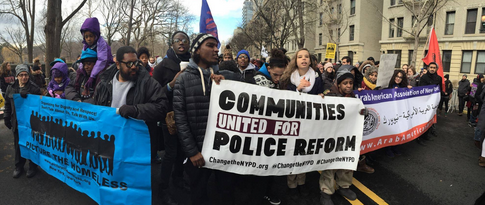[Healthcare News]
NY AG James: “The Trump Administration’s repeated attempts to strip coverage away and deny access to care for millions of Americans is shameful.”
Photo: Wikimedia Commons
New York Attorney General Letitia James today led a coalition of 26 public jurisdictions and health care providers in filing a motion for summary judgment, requesting that the United States District Court for the Southern District of New York block the Trump Administration’s refusal-of-care rule.
The rule seeks to expand the ability of businesses and individuals to refuse to provide vital health care services on the basis of a business’s or an employee’s “religious beliefs or moral convictions.”
“The Trump Administration’s repeated attempts to strip coverage away and deny access to care for millions of Americans is shameful,” said Attorney General Letitia James. “We are asking the court to flatly reject this rule so health care providers cannot openly discriminate and refuse care to patients. This ‘health care refusal’ rule must be stopped, and our coalition of states, cities, municipalities, and national health care organizations and providers is a testament to the damage this single rule can impose on our nation’s health.”
In January 2018, the Trump Administration’s Department of Health and Human Services (HHS) initially proposed the rule that would expand the ability of businesses and individuals to refuse to provide necessary health care on the basis of their “religious beliefs or moral convictions.” New York and a coalition of states from around the nation immediately submitted a comment letter to the Administration urging that the rule be withdrawn. In May 2019 — after the rule was nevertheless adopted — Attorney General James led the coalition states in filing a lawsuit against the Administration arguing that the rule would fundamentally increase the number of reasons and ways Americans across the country could be denied essential health services. In June, Attorney General James led that same coalition in seeking a preliminary injunction to prevent implementation of the rule. The court pushed back the original implementation date of July 2019 for the rule, and today Attorney General James is asking the court to hold that the refusal-of-care rule violates federal statutory law and the U.S. Constitution.
The lawsuit alleges that the final rule, if implemented, would undermine the delivery of health care by giving a wide range of health care institutions and individuals a right to refuse care, based on the provider’s own personal views. The rule drastically expands the number of providers eligible to make such refusals, ranging from ambulance drivers to emergency room doctors to receptionists to customer service representatives at insurance companies. Additionally, the rule makes this right absolute and categorical, and no matter what reasonable steps a health provider or employer makes to accommodate the views of an objecting individual, if that individual rejects a proposed accommodation, a provider or employer is left with no recourse.
Under the rule, a hospital could not inquire, prior to hiring a nurse, if that individual objected to administering a measles vaccination — even if this was a core duty of the job in the middle of an outbreak of the disease. An emergency room doctor could also refuse to assist a woman who arrived with a ruptured ectopic pregnancy, even if the woman’s life was in jeopardy. Businesses, including employers, would be able to object to providing insurance coverage for procedures they consider objectionable, and allow individual health care personnel to object to informing patients about their medical options or referring them to providers of those options. The devastating consequences of the rule would fall particularly hard on marginalized patients, including LGBTQ+ patients, who already confront discrimination in obtaining health care.
The lawsuit further alleges that the risk of noncompliance is the termination of billions of dollars in federal health care funding. If HHS determines, in its sole discretion, that states or cities have failed to comply with the final rule — through their own actions or the actions of thousands of sub-contractors relied upon to deliver health services — the federal government could terminate funding to those states and cities to the price tag of hundreds of billions of dollars. States and cities rely upon those funds for countless programs to promote the public health of their residents, including Medicaid, the Children’s Health Insurance Program, HIV/AIDS and STD prevention and education, and substance abuse and mental health treatment.
The lawsuit argues that this drastic expansion of refusal rights, and the draconian threat of termination of federal funds, violates the federal Administrative Procedure Act, as well as the Spending and Establishment Clauses and the separation of powers principles in the U.S. Constitution.
Joining Attorney General James in filing today’s motion are the attorneys general of Colorado, Connecticut, Delaware, Hawai‘i, Illinois, Maryland, Massachusetts, Michigan, Minnesota, Nevada, New Jersey, New Mexico, Oregon, Pennsylvania, Rhode Island, Vermont, Virginia, Wisconsin, and the District of Columbia; the Cities of New York and Chicago; and Cook County, Illinois. Additionally, two separate lawsuits were brought against the Trump Administration for implementation of this rule by Planned Parenthood Federation of America and one of its affiliates, as well as by the National Family Planning and Reproductive Health Association and Public Health Solutions, which have now been consolidated into this lawsuit.
New York’s action has been led by Matthew Colangelo, Chief Counsel for Federal Initiatives, Assistant Attorneys General Amanda Meyer and Justin Deabler in the Civil Rights Bureau, and Health Care Bureau Chief Lisa Landau. The Health Care and Civil Rights Bureaus are part of the New York Attorney General’s Social Justice Division, led by Chief Deputy Attorney General Meghan Faux.








